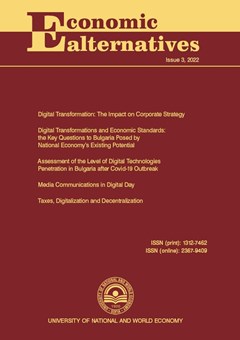Digital Transformations and Economic Standards: the Key Questions to Bulgaria Posed by National Economy’s Existing Potential
Author: Diana Nikolova Genkova
Abstract
In this paper, we consider some of the major challenges that digital transformations (DTs) have posed to the economic management. Digital transformation is an imperative for modern companies to succeed. Other researchers identified some specific factors of companies’ DTs success, among them incremental transformations, cost-effectiveness and sustainability of organizational changes (BCG, 2021). This identification stemmed from the microeconomic viewpoint by examining the experience of large companies, which operate in global markets. We welcome this identification. However, we argue that DTs success and benefits could and should be examined from other viewpoints too, especially, from the position of society, in particular, the community at a national level. We state DTs have not the same scope and role by regions and countries, as economic standards raise some barriers against this process. In other words, the parameters of socio-economic environment are one of the significant factors of the success of companies’ DTs. We make a difference between the two major groups – the micro and the macro factors of DTs, based on an overview of ICT changing role over the latest three technological revolutions from industry 3.0 to industry 5.0. To test our hypothesis, we conducted an empirical analysis based on the holistic approach (the macroeconomic perspective). We made a comparative analysis by country, starting from the viewpoint of the Bulgarian economy and thus turning the scope to the domestic socio-economic environment. We examined the position of the ICT sector and the role it plays for the community at large, especially, for consumer behavior in the recent decade. Several sub-hypotheses are tested. The output of the analysis allowed us to conclude, by now, that the increasing position of the ICT sector in the Bulgarian economy, which converging with general trends, is still not indicative of improvements in the economic and living standards of the country.

